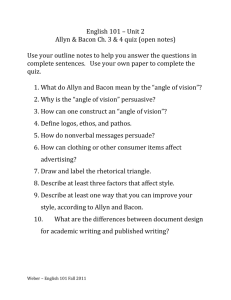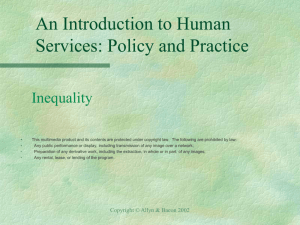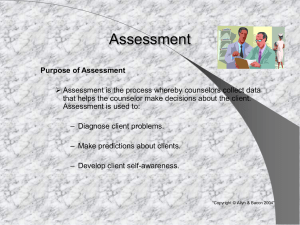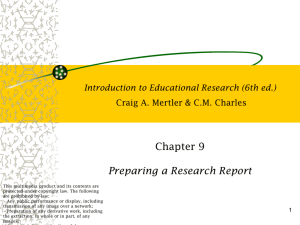Chapter 5 Socialization
advertisement
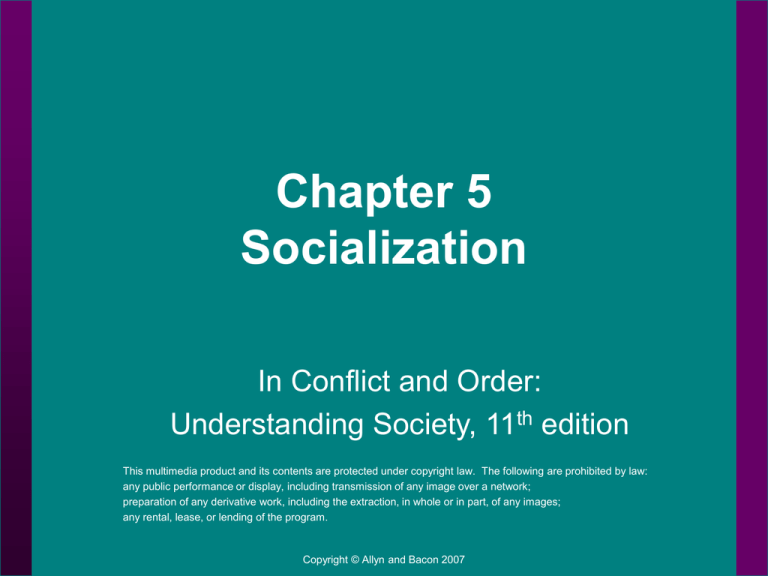
Chapter 5 Socialization In Conflict and Order: Understanding Society, 11th edition This multimedia product and its contents are protected under copyright law. The following are prohibited by law: any public performance or display, including transmission of any image over a network; preparation of any derivative work, including the extraction, in whole or in part, of any images; any rental, lease, or lending of the program. Copyright © Allyn and Bacon 2007 The Personality as a Social Product • We are all the product of nature and nurture. • We develop our sense of self (our personality) in interaction with other people. • Newly born infants have no sense of selfawareness. Copyright © Allyn and Bacon 2007 Charles H. Cooley • Cooley believed that children’s conceptions of themselves arise through interaction with other people. • He used the metaphor of a looking glass self. • Through interaction children define themselves according to how they interpret how people think of them. Copyright © Allyn and Bacon 2007 George Herbert Mead • Mead’s theory of self-development involves several stages. – In the play stage children pretend to be a variety of adult roles (taking the role of the other). • In the game stage children play at games with rigid rules. – They begin to understand the structure of the entire game with the expectations for everyone involved. – This understanding of the entire situation is called “the generalized other”. Copyright © Allyn and Bacon 2007 Sigmund Freud • According to Freud’s theory, socialization is the process by which society controls the id (the biological needs for pleasure). – Through this process, children develop egos (the control of the id by finding appropriate ways to satisfy biological urges). – A superego also emerges, which is the internalization of the morals of the parents, further channeling behavior in socially acceptable ways. Copyright © Allyn and Bacon 2007 Albert Bandura • According to Bandura’s social cognitive theory, children observe the behavior of others and the feedback (positive and/or negative) for such behavior. – This then serves as a guide for their actions as they model after others. Copyright © Allyn and Bacon 2007 Society’s Socialization Agents • Personality of the child is, to a large degree, socially created and sustained. • Through the process of socialization, the child internalizes the norms and values of a society. Copyright © Allyn and Bacon 2007 Society’s Socialization Agents The Family The Media The Schools Copyright © Allyn and Bacon 2007 The Media Ten multinational corporations control television, radio, movies, books, magazines, and the internet in the U.S. Copyright © Allyn and Bacon 2007 The Media • The concentration of the media in the hands of the few results in: – As ideological monopoly that supports the status quo – An emphasis on entertainment over news – An emphasis on profit making over information gathering – News of local interest being sacrificed for what media moguls consider of interest to the widest national audience Copyright © Allyn and Bacon 2007 Similarities and Differences Among Members of Society • Because the socialization agents of society present a relatively consistent picture, the members of a society tend to be alike in fundamental ways (modal personality type). • The smaller and more homogenous the society, the more alike the members of that society will be. Copyright © Allyn and Bacon 2007 Similarities and Differences Among Members of Society • Even though individuals within societies are socialized and generally comply with the demands of their society, every society has its deviants. • Despite the tendency for the members to be alike, people, especially in large, heterogeneous societies, are not all similar. Copyright © Allyn and Bacon 2007 Similarities and Differences Among Members of Society • The sources of deviation are the differences found in: – Family – Schools – Religion – Social Location – Generation Cohort – Contradictory Influences and Role Conflicts Copyright © Allyn and Bacon 2007 Contradictory Influences and Role Conflicts • Order theorists view socialization as necessary to promote solidarity and the development of law-abiding citizens. Copyright © Allyn and Bacon 2007 Contradictory Influences and Role Conflicts • Conflict theorists view the process as one in which people are led to accept the customs, laws, and values of society uncritically. – This process is so powerful that disadvantaged people may accept the system that disadvantages them (false consciousness). Copyright © Allyn and Bacon 2007
